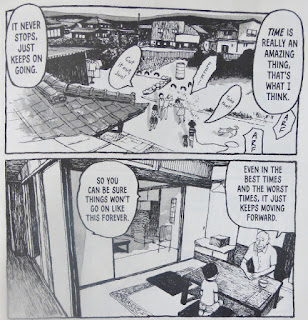Creator: Taiyo Matsumoto
- It's tough if you think your parents are still around - Tsuda
What's to be said about this magnificent series that will do it justice? If your only experience with manga is the action-oriented stories like Akira, then this will serve to demonstrate some of the diversity that exists in the Japanese comic scene as it is some distance from that style, as effective and as good as some of those comics are.
Sunny is set in the 1970s in a special Japanese orphanage. This type of orphanage is one where the children's parents are not necessarily deceased but, for one reason or another, cannot look after their offspring. Each chapter focuses on one of the children and over time we build up a picture of them, their feelings and emotions and how they cope with knowing their parents are out there.
In this volume, we're treated to a story about my favourite, Haruo, a tough and troublesome kid who carries around a jar of Nivea as the smell reminds him of his mother. We also see Sei, a character we were introduced to in the first chapter of volume one. He's a lovely, studious boy always thinking his parents are coming back for him He took some time to settle down but eventually seems to have made something of a home from home for himself at the orphanage. Unfortunately it is the “from home” part of that statement that is still affecting Sei and which drives his actions in this section.
Next we have Junsuke who is in the orphanage with his sibling Shosuke. Junsuke is our cover star, depicted with that intense snotty nose that kids seem to get. Junsuke and Shosuke's mother is in hospital. We are never told what it is but the impression is that it is something serious. Again this is bittersweet as we see a young child trying to be tough but inevitably succumbing to his fears in a realistic manner, quietly crying somewhere quiet.
Children coping, adapting and learning is a bit of a theme, and nowhere is this demonstrated better than in Megumu's chapter, in which her aunt and uncle come to visit with the best of intentions. Megumu though is only a young girl and she struggles to cope with the complicated feelings that arise. Matsumoto shows a deft touch here as he depicts the aunt and uncle's reaction to Magumu's less than grateful behaviour.
There are a couple more stories in here equally as good. Stylistically this book just oozes the period, from the card the cover is printed on, to the lettering used for the title, to the depiction of the Datsun Sunny in a washed out yellow on the back cover. Inside the artist peppers the strips with little background details of 1970s Japanese culture which help immerse the reader in the setting. Most importantly it is printed in it's native form of right-to-left, so the pages do not lose any of the subtle balance they can when these books are changed to a western format.
All in all Sunny is a wonderful read and testament to the strength of the Japanese comics scene. It is at its most effective when you allow it to slowly build. Start with volume one and get to know these kids bit by bit. You'll find it's an emotional and rewarding experience.

